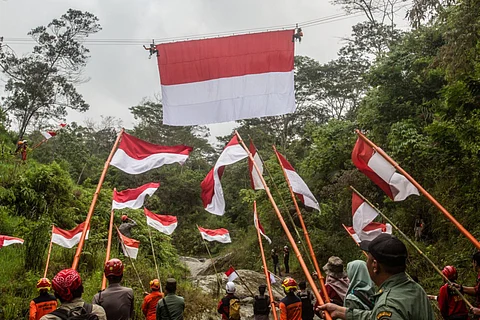
- NEWS
- the EDIT
- COMMENTARY
- BUSINESS
- LIFE
- SHOW
- ACTION
- GLOBAL GOALS
- SNAPS
- DYARYO TIRADA
- MORE

Today, Indonesia turns up the volume on patriotism, pageantry, and pure, unadulterated fun.
Today is Hari Kemerdekaan — Indonesia’s Independence Day — but around the archipelago it’s lovingly called Tujuhbelasan, “the Seventeenth.”
Suppose you imagine a national birthday party where civic pride meets neighborhood chaos. In that case, you’ve got the right picture: streets awash in red-and-white bunting, schoolchildren marching in crisp uniforms, flags flying from every home, and an unmistakable scent of fried snacks and celebration in the air.
The day begins, as it always does, with the nation watching. In the morning, the country tunes in to a live broadcast from Merdeka Palace in Jakarta, where the president and vice-president re-enact the 1945 proclamation of independence.
The ceremony is solemn and ceremonial — a gun salute, a moment of silence for fallen heroes, a choir of students raising the flag to the national anthem — and yet it is only the midday overture to a much more raucous, joyful program of community life that fills the rest of the day.
Throughout August, the red-and-white motif takes over public transport, storefronts, and private homes; on the 17th itself, everywhere you look, someone is wearing a flag pin, tying a ribbon, or trying and failing to eat a hanger of crackers with hands tied behind their back.
What makes Tujuhbelasan feel so alive is the way history becomes play. The traditional competitions that fill plazas and schoolyards — the cracker-eating race, the greased-pole climb known as panjat pinang, sack races, and tug-of-war — are not mere party games.
They are living, noisy reminders of a people who once fought for every inch of their freedom. When participants scramble up an oil-slicked pole to grab prizes, or try to snaffle a dangling cracker without their hands, they are performing, in comic miniature, the grit and ingenuity of earlier generations who endured scarcity and danger for independence.
The red in the flag stands for courage; the white for purity — symbols that echo in the laughter and in moments of reflection alike.
There is also a distinctly local, mischievous charm to the way Indonesians throw these celebrations. Neighborhood committees compete in choreographed marches and float parades; children decorate bicycles in patriotic colors and race them down main streets; families pack picnics and swap stories of grandparents who lived through the revolution.
Happy chaos
It’s impossible to witness a village panjat pinang without grinning at the cooperative chaos — men forming human pyramids, teenagers hoisting one another higher and higher, and a delighted crowd cheering as someone finally claws a radio or a bag of rice from the summit. The prizes are practical, the mess is spectacular, and the sense of shared accomplishment is unmistakable.
Beneath the laughter and the games, the story of Indonesian independence is profoundly profound and resonant. On 17 August 1945, Sukarno and Mohammad Hatta proclaimed the birth of the Republic of Indonesia.
What followed was years of intense struggle — diplomatic wrangling and armed conflict — until sovereignty was effectively secured at the close of the 1940s. The revolution reshaped society and politics across thousands of islands; it was a difficult birth, marked by sacrifice and determination.
The games and parades of Tujuhbelasan are a buoyant response to that history: they transform memory into community, and trauma into celebration. Each boisterous crowd is, in its own way, an act of gratitude.
There are moments during the day when the mood shifts from revelry to reverence. In a quiet town square, an elder might tell a child about rationed rice and underground meetings, or a teacher might point to a photograph of a local hero who fought in the independence struggle. These small remembrances thread the modern fiesta back to a past where courage was exercised not on a parade ground but in forests and villages and diplomatic rooms where futures were bargained and won.
For Filipinos watching from across the sea, Indonesia’s Independence Day feels like a cousin’s big family reunion. We have our own 12 June remembrance and our barangay fiestas, where sack races and lechón share the program with solemn rites.
What connects us is a shared Southeast Asian rhythm: the intertwining of solemn remembrance with rambunctious celebration, the idea that liberty is both a legacy to honor and a communal party to hold. In our barangays, we understand the crowd that cheers when someone conquers the greased pole; we nod at the pride that lifts a flag; we relish the messy, delicious food that follows a long ceremony.
So today, when the streets fill with bands and the air is thick with the smell of fried snacks and the sound of laughter, remember that Indonesia is celebrating not just a date, but a spirit: joyous, resilient and occasionally hilariously slapstick. Raise a cup of kopi or a chilled Bintang, or simply your hands in applause, and say, “Selamat Hari Kemerdekaan!”
Celebrate the games, admire the pageantry, and tip your hat to the history that made the revelry possible. Long live freedom, and long live the neighborly joy that turns national history into a shared, laughter-filled street party.
